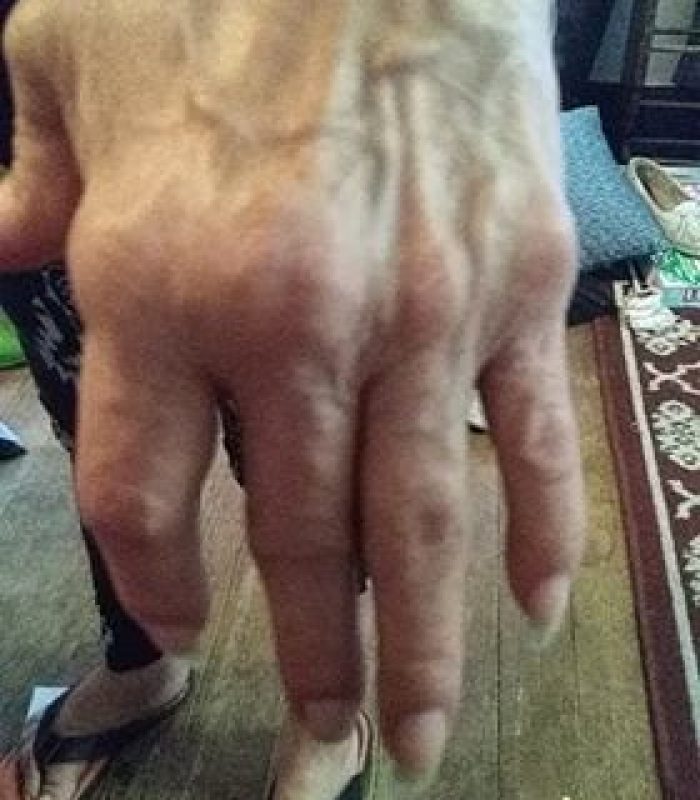After a herniated disc pressed bone fragments into my spinal cord, I was told I would never walk again. Luckily, I have cannabis.
I’m 61 years old. I lived in Alaska for 35 years, working as a paramedic and on crab boats trawling to Siberia. Then moved to Oregon in 2014. Its there that I herniated my disc.
While I was in Oregon, cutting fire blocks for force fire, I felt a pain in my lower back and eventually had to go home early as the pain kept increasing throughout the day. The next morning, I woke in agony, 100% paralyzed from the waist down, laying in my own excrement because I had lost all motor control from the waist down.
I was rushed to the hospital. They gave me emergency surgery for a herniated disc with fractured bone fragments pressing up against my spinal cord that were cutting off the blood supply and damaging my nerves!
My balance was gone. I couldn’t walk!
Intense PT After Herniated Disc
I spent 28 days in the hospital and endured intense physical therapy. When I was released, in a wheelchair, my doctor said I would probably never walk again and certainly never work.
As good fortune would have it, at the time I lived with a cannabis grower. We grew high CBD strains of cannabis: Charlotte’s Web and AC/DC! So I taught myself how to make the oil and started taking it at night before I went to bed. I saw my doctor one more time 30 days after discharge… and I never saw him again!
I tossed out the dozens of pharmaceutical drugs that I was given in the hospital and for the last 2 1/2 years I’ve taken nothing but high strength of CBD that I grew and made into oil myself.
Today, I just got off eight hours of working on a hemp farm outside of Ashland, Oregon! On my own farm, I continue to grow Charlotte’s Web and AC/DC for myself and about 2 dozen patients.
In the near future I hope to have a 5 acre farm where I will grow hemp and medical cannabis to make into oil to continue this amazing journey of spreading abundance and health to as many people as possible!
From RxLeaf: Could CBD Help a Herniated Disc?
So, how exactly might CBD have helped this patient recover from a herniated disc? Without knowing the details about the pharmaceutical medications he was prescribed, or all of the factors leading to his herniated disc, we can only speculate. Scientists are still in the process of learning how CBD affects the body, and where it can do the most good.
What we do know is that CBD has a low toxicity profile. That makes it generally safe to consume, giving patients like this the opportunity to experiment. And in this case, CBD gave him his life back. And thanks to the growing amount of research emerging daily on the benefits of CBD, there are clues as to how it helped him.
CBD Might Help Treat Intervertebral Disc Damage
Studies are showing that CBD might have anti-degenerative properties, which may offer us a clue as to how it helped this patient regain his mobility. A 2014 animal study[1]Silveira, João W, et al. “Protective Effects of Cannabidiol on Lesion-Induced Intervertebral Disc Degeneration.” PloS One, Public Library of Science, 17 Dec. 2014, … Continue readingpublished in PLOS One discovered that a high dose of CBD was able to significantly improve intervertebral disc lesions.
Researchers treated mice with disc degeneration with 30, 60, and 120 nano-mol doses of CBD. They found that 120 nano-mol of CBD showed anti-degenerative effects on disc lesions after fifteen days. The treatment actually prevented histological changes in the annulus fibrosus tissue, and researchers corroborated their results through an MRI analysis.
Further research is needed to assess the exact mechanisms involved, but this study shows remarkable promise for disc degeneration treatment. However, the authors of the study theorized that CBD’s anti-inflammatory and analgesic capabilities may hold the answer.
CBD as an Anti-Inflammatory
Scientific research continues to show that CBD can indeed help alleviate inflammation. And not only that, but it could also help impact spasticity related to neuropathic pain. A study published in the Journal of Experimental Medicine (2012) [2]Xiong, Wei, et al. “Cannabinoids Suppress Inflammatory and Neuropathic Pain by Targeting α3 Glycine Receptors.” The Journal of Experimental Medicine, The Rockefeller University Press, 4 June … Continue reading found that CBD can significantly improve chronic inflammation and reduce neuropathic pain in mice.
It turns out, CBD can actually enhance the activity of glycine receptors, which are important targets for regulating pain related to the spine. The next question is, can CBD have the same effect on humans? In this patient’s case, the answer could be a yes.
And, on top of this good news, researchers discovered that CBD can treat pain without causing analgesic tolerance. This kind of tolerance requires patients to frequently increase drug dosages in order to achieve noticeable results. When it comes to chronic pain, avoiding analgesic tolerance is key for long-term treatment.
References







